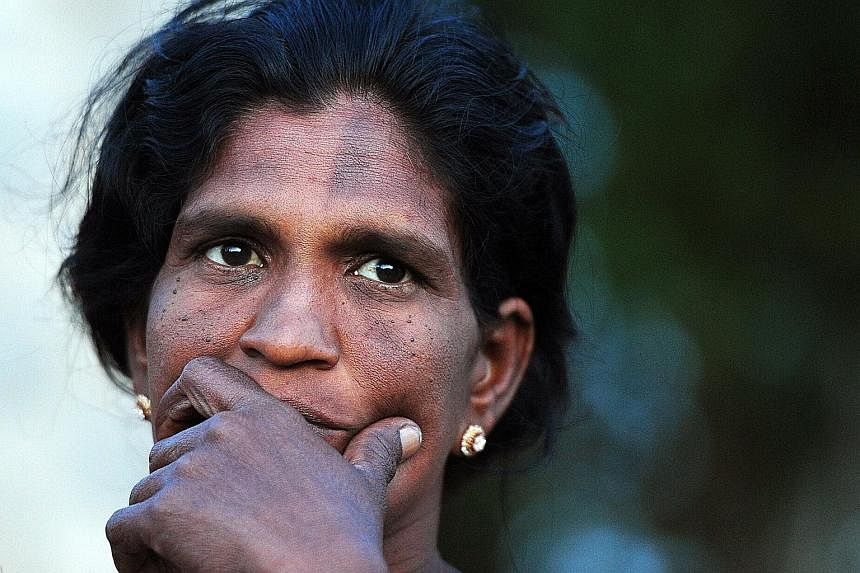JAFFNA - Shunned, destitute and pushed into prostitution in some cases, Sri Lanka's Tamil widows have returned to northern Jaffna since the end of the separatist war, only to discover they are not welcome in their homeland.
Now, six years after the war ended, the women who fled the fighting in the thousands are pinning their hopes on the nation's new president for a better future for their families.
"Widows are despised in our society," said Ms Baskaran Jegathiswari, 50, fighting back tears at her home in Achchuveli village in Jaffna, the heartland of Sri Lanka's ethnic Tamil minority.
"People look down on us. They think we bring bad luck," said Ms Jegathiswari, who lost her husband to military shellfire just months before the war ended in 2009.
The women, whose husbands were killed or are still listed officially as missing, are closely watching President Maithripala Sirisena, who took office in January pledging reconciliation to "heal broken hearts and minds". Official figures show 27,000 widows heading households in Jaffna, where the conflict was centred, but local politicians say the figure is much higher.
"I can't think of rebuilding my life now," said widow Evin Selvy, who struggles to feed her family on wages of 500 rupees (S$5) a day as a farm labourer. "But I hope the new government will make it better for my three daughters."
Having taken refuge elsewhere in the north, Ms Selvy returned to Jaffna in 2009 to find her home and village destroyed in the fighting.
The 45-year-old had fled in 1990 with her husband, who was killed in the war's final months.
She and her daughters now live in a hut alongside their house, which has been partly rebuilt with funding from an Indian government project for war victims. But they cannot afford the remaining 200,000 rupees needed to finish it.
At least 100,000 people were killed in the war between 1983 and 2009, when the military finally crushed Tamil rebels fighting for a separate homeland for the ethnic minority.
Widows left behind say they feel vulnerable, with reports of physical abuse by members of their community. Others are ostracised, considered bad luck by the conservative Hindu society.
Many struggle to find jobs and cannot make ends meet, with some forced into prostitution, said social worker Dharshini Chandiran.
Several widows told Agence France-Presse that even family friends try to take advantage of their plight, seeking sex in return for financial or other assistance.
Well-meaning members of the Tamil community are also urging them to remarry for some security, said women's activist Mariarosa Sivarasa.
But some widows are being targeted by criminals to leave their villages and work as prostitutes in larger towns, said Ms Ananthi Sasitharan, 43, a member of the local Northern Provincial Council.
Despite the problems, Ms Sasitharan said she was optimistic that Mr Sirisena would take up their plight, with signs that his government is moving towards reconciliation. "He appears (to be) a simple person... I feel we can even call him directly to discuss any problem," Ms Sasitharan told AFP.
On Friday, Mr Sirisena ordered the dismissal of Parliament, clearing the way for a general election expected to be held in August, in a bid to strengthen his party's numbers and bolster his mandate for reform. The government has started returning some land throughout the north to families whose property was seized by the military during the war.
The President has also pledged a domestic inquiry into allegations made by a United Nations panel of atrocities committed in the fighting, including the killing of thousands of civilians and sexual violence by soldiers. But widows and the wider Tamil community argue there is still a long way to go, including meeting a key demand to remove large concentrations of troops still stationed in the north.
"We think the new president wants to change things," Ms Sivarasa said.
AGENCE FRANCE-PRESSE

